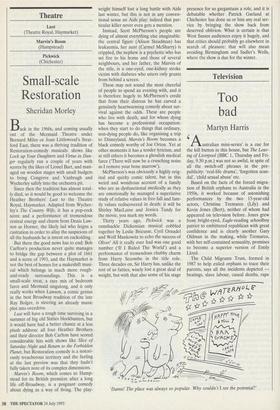Theatre
Lust (Theatre Royal, Haymarket) Marvin's Room (Hampstead) Pickwick (Chichester)
Small-scale Restoration
Sheridan Morley
Back in the 1960s, and coming usually out of the Mermaid Theatre under Bernard Miles or Joan Littlewood's Strat- ford East, there was a thriving tradition of Restoration-comedy musicals: shows like Lock up Your Daughters and Virtue in Dan- ger regularly ran a couple of years with scores by the likes of Lionel Bart, and man- aged on wooden stages with small budgets to bring Congreve and Vanbrugh and Wycherley safely into the orchestra pit.
Since then the tradition has almost total- ly died, so it would be good to welcome the Heather Brothers' Lust to the Theatre Royal, Haymarket. Adapted from Wycher- ley's The Country Wife, it has a pop-rock score and a performance of tremendous central energy and charm from Denis Law- son as Homer, the likely lad who feigns a castration in order to allay the suspicions of all the husbands he is intent on cuckolding.
But there the good news has to end: Bob Carlton's production never quite manages to bridge the gap between a plot of 1661 and a score of 1993, and the Haymarket is not the best of homes for a makeshift musi- cal which belongs in much more rough- and-ready surroundings. This is a small-scale treat, a rare mix of bedroom farce and Mermaid singalong, and it only really works when Lawson, a comic genius in the best Broadway tradition of the late Ray Bolger, is steering an already manic plot into overdrive.
Lust will have a tough time surviving in a summer of big old Sixties blockbusters, but it would have had a better chance at a less plush address: all four Heather Brothers and their director Bob Carlton have scored considerable hits with shows like Slice of Saturday Night and Return to the Forbidden Planet, but Restoration comedy is a notori- ously treacherous territory and the feeling at the last preview was that they hadn't fully taken note of its complex dimensions.
Marvin's Room, which comes to Hamp- stead for its British premiere after a long life off-Broadway, is a poignant comedy about dying as a way of living. The play- wright himself lost a long battle with Aids last winter, but this is not in any conven- tional sense an Aids play: indeed that par- ticular killer never even gets a mention.
Instead, Scott McPherson's people are dying of almost everything else imaginable: the central figure (Alison Steadman) has leukaemia, her aunt (Carmel McSharry) is crippled, the nephew is a psychotic who has set fire to his home and those of several neighbours, and her father, the Marvin of the title, is a one-eyed, one-kidney stroke victim with diabetes who utters only grunts from behind a screen.
These may not sound the most cheerful of people to spend an evening with, and it is therefore hugely to McPherson's credit that from their distress he has carved a genuinely heartwarming comedy about sur- vival against the odds. These are. people who live with death, and for whom dying has become a professional occupation: when they start to do things that ordinary, non-dying people do, like organising a trip to Disneyland, Marvin's Room becomes a black comedy worthy of Joe Orton. Yet at other moments it has a tender lyricism, and at still others it becomes a ghoulish medical farce (`There will now be a crunching noise as I remove your bone marrow).
McPherson's was obviously a highly orig- inal and quirky comic talent, but in this weird and wondrous account of a family who are as dysfunctional medically as they are emotionally he managed a superlative study of relative values in free fall and fam- ily values rediscovered in death: it will be Shirley MacLaine and Jessica Tandy for the movie, you mark my words.
Thirty years ago, Pickwick was a ramshackle Dickensian musical cobbled together by Leslie Bricusse, Cyril Ornadel and Wolf Mankowitz to echo the success of Oliver! All it really ever had was one good number Of I Ruled The World') and a performance of tremendous chubby charm from Harry Secombe in the title role. Three decades on, Sir Harry has, unlike the rest of us fatties, wisely lost a great deal of weight, but with that also some of his stage presence for so gargantuan a role, and it is debatable whether Patrick Garland at Chichester has done us or him any real ser- vice by bringing the show back from deserved oblivion. What is certain is that West Sussex audiences enjoy it hugely, and that critics should probably go elsewhere in search of pleasure: that will also mean avoiding Birmingham and Sadler's Wells, where the show is due for the winter.


















































 Previous page
Previous page